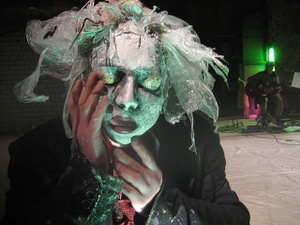ORESTIE I-IV
In the organizer's words:
How do you show war in the theater? Does it not elude representability?
The plays of the Oresteia do not depict acts of war, nor are they set in war zones, but in regions that were ostensibly spared from war - and on the side of the victors. This is where the reflection of war can be seen. And here, too, it is devastating. Even for those who actually emerged from the battle as winners, the war does not seem to have been worth it. The cost and the consequences are too terrible.
"The 2500-year-old trilogy describes the basic psychological structure that leads people to go to war: Everyone thinks they are in the right. For everyone, war and murder promise the restoration of a once rightful state. But it also shows that this does not work. One more murder - then everything will be fine. The Oresteia makes it plausible that people put themselves in the position of the murderer - and describes how overwhelmed they are. The hoped-for redemption after the murders does not materialize. The answer: new murders. With inescapable mercilessness, it is shown how new revenge and retribution are constantly being generated, but how there is never any reparation for the suffering endured. How do we get out of this? Is leaving this absurd circle also something that is given to man?" Nicolas Stemann
Nicolas Stemann's new version of this ancient material is set against the backdrop of a present that shows us the effects and impotence of war on a daily basis. After a break of several years, Stemann returns to the Thalia Theater, where he had a strong influence on the early years of the directorship.
Premiere October 30, 2024, Thalia Theater
Co-production with the Salzburg Festival 2024











